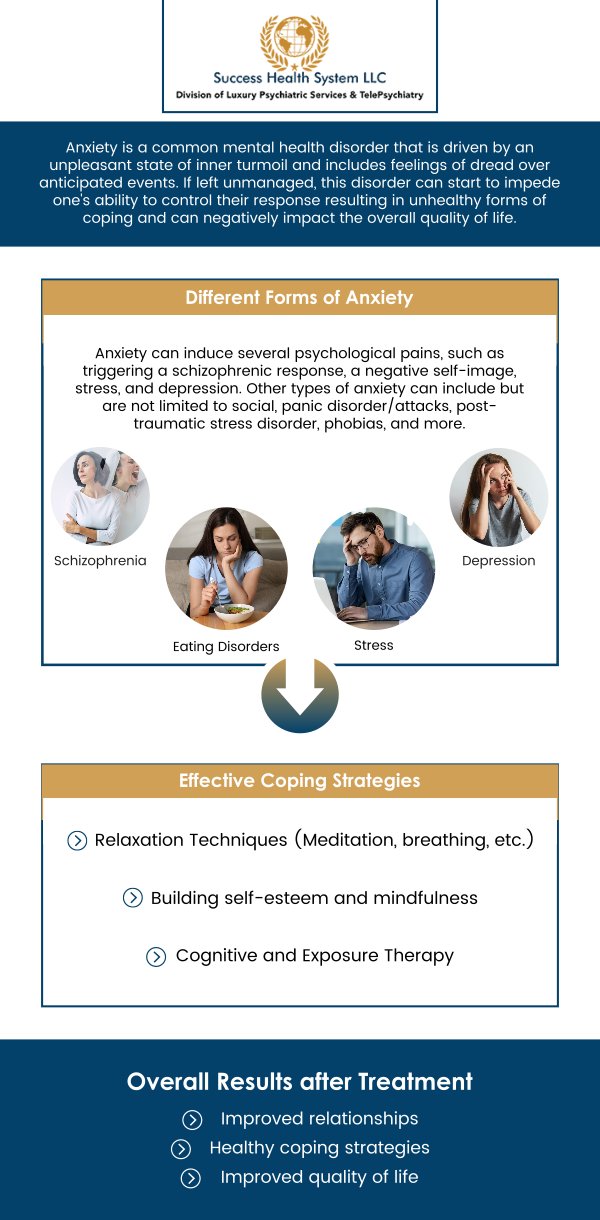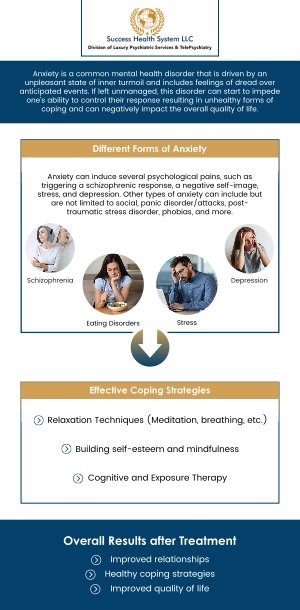Separation Anxiety Disorder in Independence, MO
Separation Anxiety Disorder (SAD) is a condition where individuals experience excessive fear or anxiety when separated from loved ones or their home. It is common in children but can affect adults as well, causing distress in situations like school or work. Dr. Moses Tabe Ambilichu, M.D., as a board-certified psychiatrist and mental health specialist, offers expert care and support to help manage and treat SAD with personalized strategies. For more information, contact us today or schedule an appointment online. We are conveniently located at 4429 S River Blvd Ste D, Independence MO, 64055.




Table of Contents:
What triggers separation anxiety disorder?
What causes separation anxiety?
What are some of the differences that distinguish separation anxiety in children from the condition in adults?
What is separation anxiety disorder?
Separation anxiety disorder is a psychological condition characterized by excessive and distressing symptoms that go beyond what is considered developmentally appropriate, leading to significant impairment in daily functioning.
Individuals with this disorder experience recurring and exaggerated distress when anticipating or being away from their home or loved ones. They constantly worry about losing a parent or loved one due to illness or a disaster, and fear something bad will happen, such as getting lost or kidnapped, resulting in separation from their caregivers. They may refuse to be away from home out of fear of separation and feel uncomfortable being home alone without a loved one present.
Although separation anxiety is a normal phase of development in infants and toddlers, for some children, it becomes a more serious condition known as separation anxiety disorder that can emerge as early as preschool age. If a child’s separation anxiety appears intense or long-lasting, particularly if it starts to interfere with school or other daily activities and includes panic attacks or other difficulties, it may indicate separation anxiety disorder.
This disorder most commonly revolves around the child’s anxiety about their parents but can also involve anxiety about other significant caregivers.
In less common instances, teenagers and adults may experience a separation anxiety disorder, leading to significant difficulties in leaving home or participating in work-related activities.
The distinction between separation anxiety in children and adults lies in various factors. In infants, separation anxiety typically emerges around 8 months of age, as they start to feel frightened in the presence of unfamiliar individuals.
They find comfort and security with their parents, becoming distressed when their parents depart. By the age of 2, toddlers begin to grasp the concept that their parents will eventually return.
While separation anxiety commonly dissipates by the age of 2, some children continue to experience it beyond this stage, leading to a condition known as separation anxiety disorder. Although this disorder predominantly affects younger children, it can also manifest in older children and adults.
A significant difference between separation anxiety disorder in children and adults lies in the individuals they are anxious about being separated from. Children typically exhibit anxiety when separated from their parents or other trusted caregivers.
For a diagnosis to be made in children, symptoms must persist for a minimum of four weeks and significantly impair their normal functioning.
In contrast, adults experience separation anxiety when separated from their children. Additionally, they may also experience separation anxiety within relationships, such as with a spouse or a significant other.
In adults, symptoms must persist for at least six months, significantly impairing their normal functioning. The separation anxiety symptoms they are experiencing should not be explained by another diagnosis.
What causes separation anxiety can be attributed to various factors. In the case of infants and young children, separation anxiety is considered a normal part of their development. It arises as they become more aware of their surroundings and form attachments to their primary caregivers.
The fear of separation is rooted in their reliance on their caregivers for safety, comfort, and basic needs. It is a natural response to their growing cognitive and emotional awareness.
However, when separation anxiety persists beyond the expected developmental stage and becomes excessive, it may indicate the presence of separation anxiety disorder.
Triggers for separation anxiety disorder can vary from person to person. The disorder is typically triggered by situations or events that involve separation from significant attachment figures.
This can include parents, caregivers, or other loved ones who provide a sense of security and support. Separation anxiety disorder can be triggered by separations due to factors such as starting school, going to daycare, or experiencing significant life changes.
Traumatic events, such as the loss of a loved one or a distressing separation experience, can also contribute to the development of separation anxiety disorder. Additionally, individual temperament, genetic predisposition, and environmental factors may play a role in triggering the disorder.
Separation anxiety disorder is available at Success Health System. For more information, contact us today or schedule an appointment online. We are conveniently located at 4429 S River Blvd Ste D, Independence MO, 64055. We serve patients from Independence MO, Raytown MO, Sugar Creek MO, Blue Springs MO, Kansas City MO, Lee’s Summit MO and surrounding areas.

Check Out Our 5 Star Reviews


Additional Services You May Be Interested In
▸Addiction Treatment
▸ADHD Treatment
▸Anxiety Treatment
▸Bipolar Disorder
▸Depressive Disorders
▸Mental Disorder
▸Obsessive Compulsive Disorders
▸Psychotic Disorders
▸PTSD Treatment
▸Phobias and Fears Therapist
▸Psychiatrist
▸Substance Disorder
▸Social Anxiety Psychiatrist
▸Medication Management
▸Psychotherapy
▸Exomind TMS – Columbia
▸Spravato – Independence

Additional Services You May Be Interested In
▸Addiction Treatment
▸ADHD Treatment
▸Anxiety Treatment
▸Bipolar Disorder
▸Depressive Disorders
▸Mental Disorder
▸Obsessive Compulsive Disorders
▸Psychotic Disorders
▸PTSD Treatment
▸Phobias and Fears Therapist
▸Psychiatrist
▸Substance Disorder
▸Social Anxiety Psychiatrist
▸Medication Management
▸Psychotherapy
▸Exomind TMS – Columbia
▸Spravato – Independence





